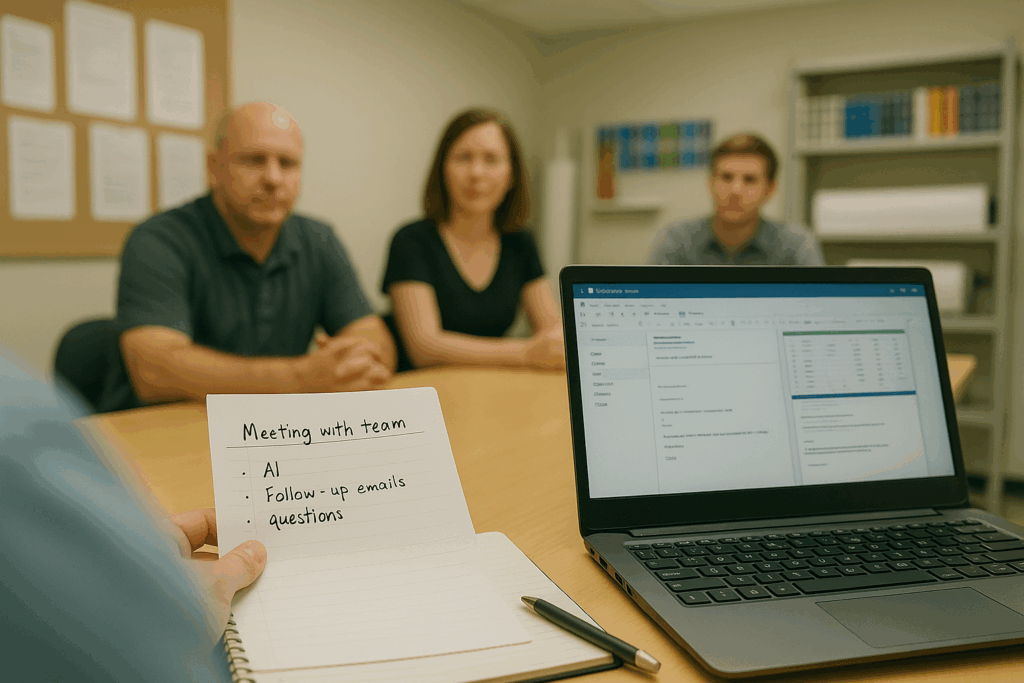From Curiosity to Conversation
If you’ve been following Clay’s story for the last few months, you’ve seen how his first experiment with AI gave him something every print shop owner needs—confidence. But confidence isn’t enough. If a business is going to grow, change has to become a conversation.
This month, in part 4 of The AI Success Journey for Printers, Clay starts talking with his team about AI… and finds out what they’re really thinking.
“Let’s Talk About AI”
Monday morning at Riverbend Print & Sign started like any other: coffee, install updates, a quick recap of orders going to production… but then Clay did something new.
“Before we wrap up this meeting, there’s one more thing I want to talk about,” he said. “Let’s spend a few minutes on AI.”
The room shifted.
Jess glanced at Rick. Rick looked down at his notes. Someone exhaled a little too loudly.
Maybe this was a mistake, Clay thought.
They’re already picturing robots in the breakroom.
But he kept going. Calm. Measured.
“Last week, I used a free AI tool to help write a follow-up email to a customer who hadn’t responded. That one message turned into something I’m now doing regularly—a simple AI workflow that saves me time and helps close the loop faster.”
Jess raised an eyebrow. “That’s cool,” she said. “But I don’t want to get replaced by a robot.”
Not Replaced. Refocused.
Clay smiled—not because it was funny, but because it was honest.
“I don’t want to replace you with a robot either,” he said.
“But I do want to give you the tools and skills that make you irreplaceable.”
Jess didn’t respond right away, but she didn’t push back either.
Tension, Questions, and One Bad Joke
Rick leaned back in his chair. “Are we supposed to start typing AI prompts instead of quoting jobs now?” he asked, half-joking.
A few people chuckled. Clay did too. But he noticed the way Rick’s arms were crossed.
They’re not mocking the idea. They’re trying to figure out if this affects them.
Clay clarified.
“I’m not changing our systems. Not today. I just want us to explore ways to save time and reduce the repetitive stuff. That’s where AI can help.”
It wasn’t a hard sell. It wasn’t even a plan. It was permission to be curious.

Turning Skepticism into Strategy
Jess leaned forward. “So what else can it do?”
Clay had planned for this. He pulled up the tool on the meeting room screen and walked through the prompt he’d used for the thank-you email.
“I wrote this with AI’s help, then edited it to sound like me. Took two minutes.”
The team read the email. Rick pointed out a phrase he didn’t like. Jess rewrote a sentence. Someone laughed at the phrase “valued partnership.”
But they weren’t dismissing it. They were engaging.
Now they’re part of it, Clay realized.
A Shift in Energy
By the end of the meeting, no one was talking about robots. No one was worried about replacement.
They were asking about possibilities.
Rick suggested testing it for quote follow-ups. Jess offered to try it for a birthday email she sends to one of their biggest clients every year.
Clay watched all of it unfold. Not as a tech breakthrough. But as the start of a shared workflow they could build on together.
They don’t need a roadmap, he thought. They need a reason to care and permission to try.
He wrapped up with a simple ask.
“I’m not asking anyone to change everything. Just try one thing, like I did. Let’s see where it goes.”
Why This Moment Matters
When you’re leading a print shop, technical change is the easy part. You can learn the tools. Read the prompts. Watch the demos.
But cultural change? That’s harder. It requires trust.
What Clay did in that meeting wasn’t a rollout. It was a relationship builder.
He wasn’t asking his team to be AI experts. He was inviting them to be explorers.
And that shift from fear to curiosity, from pressure to permission, is what unlocks real momentum.
Next month in the series
Clay finds a surprising win on the production side and discovers that AI might be better at time management than he is.


